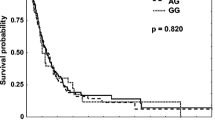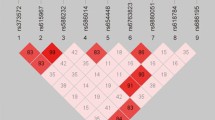Abstract
A few reports for ERCC1 SNPs were conducted in patients treated with cisplatin chemotherapy. The aim of this study is to determine whether the SNPs are a prognostic factor related to the treatment or not and if smoking level of the patients have any relationship to the SNPs' effect on the survival. Peripheral blood lymphocytes of 423 consecutive non-small cell lung cancer patients were examined: 245 of the patients received cisplatin combination chemotherapy and 178 received only conservative care. We examined ERCC1 SNPs (codon 118 C/T and 8092 C/A). Whereas ERCC1 118 SNP had no effect on the survival in patients' given no treatment, an effect of the SNP was observed in the treatment group, especially in stage III. When smoking was considered, the risk effect of the T allele was shown to be significantly associated with the group that had more than 50 pack yr (p=0.03). As for the ERCC1 8092 C/A, no significant effects were observed in the treated group and the non-treatment group. These findings may suggest that the ERCC1 118 SNP is an useful prognostic factor related to cisplatin therapy and the effect of this polymorphism appears to be modified by prognostic factor related to cisplatin therapy and the effect of this polymorphism appears to be modified by smoking.
Similar content being viewed by others

References
Paez JG, et al. EGFR mutations in lung cancer: correlation with clinical response to gefitinib therapy. Science 2004; 304 (5676): 1497–1500.
Lynch TJ, et al. Activating mutations in the epidermal growth factor receptor underlyingresponsiveness of non-small-cell lung cancer to gefitinib. N Engl J Med 2004; 350(21): 2129–2139.
Georgoulias V, et al. Greek Oncology Cooperative Group (GOCG) for Lung Cancer. Platinum based non platinum based chemotherapy in advanced nonsmall cell lung cancer: a randomized multicentre trial. Lancet 2001;357: 1478–1484.
Miller VA, Rigas JR, Grant SC, Pisters KM, Kris MG. New chemotherapeutic agents for non small cell lung cancer. Chest 1995;107 (Suppl 6): 306S-311S.
Schiller JH, et al. Eastein Cooperative Oncology Group. Comparison of four chemotherapy regimens for advanced non small cell lung cancer. N Engl J Med 2002;10 (346): 92–98.
Reed E. Platinum DNA adduct, nucleotide excision repair and platinum based anti-cancer chemotherapy. Cancer Treat Rev 1998;24: 331–344.
Lindahl T, Karran P, Wood RD. DNA excision repair pathways. Curr Opin Genet Dev 1997;7: 158–169.
Li Q, et al. Association between the level of ERCC1 expression and the repair of cisplatin induced DNA damage in human ovarian cancer cells. Anticancer Res 2000;20 (2A): 645–652.
Wei Q, Cheng L., Hong WK, Spitz MR. Reduced DRC in lung cancer patients. Cancer Res 1996;56: 4103–4107.
Metzger R, et al. ERCC1 mRNA levels complement thymidylate synthase, mRNA levels in predicting response and survival for gastric cancer patients receiving combination cisplatin and fluorouracil chemotherapy. J Clin Oncol 1998;16: 309–316.
Ferry KV, Hamilton TC, Johnson SW. Increased nucleotide excision repair in cisplatin resistant ovarian cancer cells: role of ERCC1-XPF. Biochem Pharmacol 2000; 60: 1305–1313.
Britten RA, Liu D, Tessier A, Hutchison MJ, Murray D. ERCC1 expression as a molecular marker of cisplatin resistance in human cervical tumor cells. Int J Cancer 2000;89: 453–457.
Shirota Y, et al. ERCC 1 and thymidylate synthase mRNA levels predict survival for colorectal cancer patients receiving combination oxaliplatin and fluorouracil chemotherapy. J Clin Oncol 2001;19: 4298–4304.
Lord RV, et al. Low ERCC1 expression correlates with prolonged survival after cisplatin plus gemcitabine chemotherapy in non-small cell lung cancer. Clin Cancer Res 2002; 8: 2286–2291.
Sturgis EM, Dahlstrom KR, Spitz MR,Wei Q. DNA repair gene ERCC1 and ERCC2/XPD polymorphisms and risk of squamous cell carcinoma of the head and neck. Arck Otolaryngol Head Neck Surg 2002;128: 1084–1088.
Rosell R, Taron M, O'Brate A. Predictive molecular markers in non small cell lung cancer. Curr Opin Oncol 2001;13: 101–109.
Park DJ, et al. ERCC1 gene polymorphism as a predictor for clinical outcome in advanced colorectal cancer patients treated with platinum based chemotherapy. Clin Adv Hematol Oncol 2003;1: 162–166.
Zhou W, et al. Excision repair cross-complementation group 1 polymorphism predicts overall survival in advanced non small cell lung cancer patients treated with platinum based chemotherapy. Clin Cancer Res 2004;10: 4939–4943.
Ryu JS, et al. Association between polymorphisms of ERCC1 and XPD and survival in non-small-cell lung cancer patients treated with cisplatin combination chemotherapy. Lung Cancer 2004;44(3): 311–316.
Suk R, et al. Polymorphisms in ERCC1 and grade 3 or 4 toxicity in nonsmall cell lung cancer patients. Clin Cancer Res 2005;11(4): 1534–1538.
Shen MR, Jones IM, Mohrenweiser H. Nonconservative amino acid substitution variants exist at polymorphic frequency in DNA repair genes in healthy humans Cancer Res 1998;58: 604–608.
Chen P, et al. Association of an ERCC1 polymorphism with adult onset glioma. Cancer Epidemiol Biomarkers Prev 2000;9: 843–847.
Zhou W, et al. Gene smoking interaction associations for the ERCC1 polymorphisms in the risk of lung cancer. Cancer Epidemiol Biomarkers Prev 2005;14(2): 491–496.
Salgia R, Skarin AT. Molecular abnormalities in lung cancer. J Clin Oncol 1998;16: 1207–1217.
Greatens TM, et al. Do molecular markers predict survival in non small cell lung cancer? Am J Respir Crit Care Med 1998;157: 1093–1097.
Isla D, et al. Single nucleotide polymorphisms and outcome in docetaxel cisplatin treated advanced non small cell lung cancer. Ann Oncol 2004;15: 1194–1203.
Park JY, et al. Polymorphism of the DNA repair gene XRCC1 and risk of primary lung cancer. Cancer Epidemiol Biomarkers Prev 2002;11: 23–27.
Ito G., et al. Gene environment interactions between the smoking habit and polymorphisms in the DNA repair genes, APE1 Aspl48Glu and XRCC1 Arg399Gln, in Japanese lung cancer risk. Carcinogenesis 2004;25(8): 1395–1401.
Wu X, et al. XPA polymorphism associated with reduced lung cancer risk and a modulating effect on nucleotide excision repair capacity. Carcinogenesis 2003;24(3): 505–509.
Zhou W, et al. Polymorphisms in the DNA Repair Genes XRCC1 and ERCC2, Smoking, and Lung cancer risk. Cancer Epidemiol Biomarkers Prev 2003;12: 359–365.
Butkiewicz D, et al. Association between the risk for lung adenocarcinoma and a (-4) G to A polymorphism in the XPA gene. Cancer Epidemiol Biomarkers Prev 2004;13 (12): 2242–2246.
David-Beabes GL, London SJ. Genetic polymorphism of XRCC1 and lung cancer risk among African Americans and Caucasians. Lung Cancer 2001;34: 333–339.
Terry MB, et al. Polymorphism in the DNA repair gene XPD, polycyclic aromatic hydrocarbon DNA adducts, cigarette smoking, and breast cancer risk. Cancer Epidemiol Biomarkers Prev 2004; 13(12): 2053–2058.
Wei Q, et al. Reduced expression of hMLH1 and hGTBP: a risk factor for head and neck cancer. Cancer Epidemiol Biomarkers Prev 1998;7: 309–314.
Author information
Authors and Affiliations
Corresponding author
Rights and permissions
About this article
Cite this article
Park, SY., Hong, YC., Kim, JH. et al. Effect of ERCC1 polymorphisms and the modification by smoking on the survival of non-small cell lung cancer patients. Med Oncol 23, 489–498 (2006). https://doi.org/10.1385/MO:23:4:489
Received:
Accepted:
Issue Date:
DOI: https://doi.org/10.1385/MO:23:4:489



